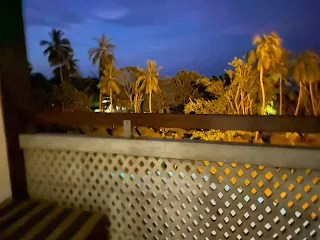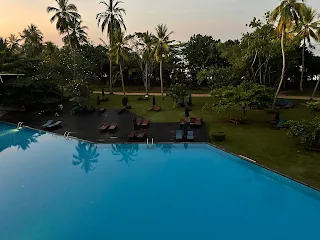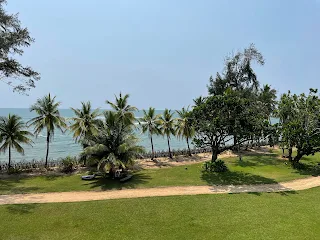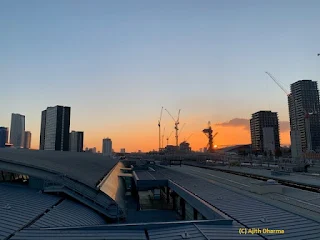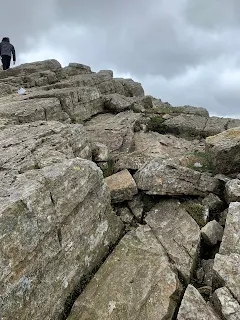"Welcome to my blog, where we delve into a wide array of impactful issues. While quantum theory is undoubtedly significant, it's just one piece of the puzzle. Here, I explore a diverse range of topics, from our exciting travels and everyday experiences to the pressing realm of politics that shapes our lives. I extend an invitation to you, dear reader, to join me in thought-provoking discussions and share your valuable insights on these matters."
Search This Blog
Saturday, 22 May 2021
Saturday, 8 May 2021
Sunday, 21 March 2021
The Quarantanians
Saturday, 6 February 2021
I was given a Vaccine, I posted in facebook
I was given the Astra Zeneca Vaccine and I posted it in facebook. I said thank you to NHS. It riled some people.
One reason I posted in here that, I was given the vaccine against the Corvid 19 is this, I was talking to a young man about 24 years of age and who is still believing in fairies. I seriously thought he is one of Peter pan’s long-lost sons. He told me that vaccine has a small chip that is very difficult to detect. Through that chip government can dictate to us what we should do. We will be fed wrong information. I told him that’s already happening through YouTube, face book, twitter and other media anyway. They don’t need a chip to insert.
Saturday, 30 January 2021
East German simple food - Schichtkraut aus der DDR
These days, Ines enjoys testing different types of food
recipes on the family. I call them Lockdown Recipes. Yesterday she tried out a recipe
we’ve never had before. She told me that it was an easy old GDR recipe (GDR
standing for German Democratic Republic, or the former East Germany, as it is
better known).
Apparently, it is called ‘Schichtkraut’. It’s pronounced ‘Shiçt-kr-out’*
(see below) but for the sake of convenience I omitted the ç. I was lucky Ines didn’t
throw the spoon at me.
What I like about this simple recipe is that it only has 3
main ingredients: minced meat, cabbage and sliced potatoes. Ines added goat’s
cheese on top, as well as cumin and other spices, and then put it into the oven
for half an hour. And that’s it.
I call it 2 in 1 food because you can drink the sauce
afterwards as if it were a nice cabbage soup. My stomach has very high acid levels,
so this dish is ideal for me. It’s not very heavy on the stomach, and the
cabbage and cumin make it easier to digest.
Try it if you’re interested.

*The ç is pronounced like the hissing sound between the ‘h’
and ‘yoo’ sounds of the 1st pronunciation of the word ‘huge’. It’s
difficult to learn, so can be substituted for a ‘k’ or ‘sh’ sound instead.
Thursday, 3 December 2020
Cuba and the cold, hard truth - Cuba and the Cameraman
I have always had a soft spot for Cuba. It is partly because of the Cuban Revolution and its charismatic leaders: Che Guevara and Fidel Castro. In our youth, we had somewhat romanticised that revolution and its leaders. In somewhat of a pure ideological dream-world, we assumed Cuba was a socialist paradise, and that the USSR was a socialist heaven. To my utter surprise, some Labour party members in the UK also regarded Cuba as a model socialist country.
Few years back, some even said they wanted to move to Cuba, and some still say that today. I think to myself, 'would you really enjoy living there when the mass media shows you how much they still don't have? I mean not only the freedom to chose your rulers, but comfortable life in the West. What's wrong with life in UK? Yes, it's a capitalist country but you still have the NHS as a free healthcare facility. If you don't have a job you are given government benefits. There are problems but housing is still decent.'
Although I have never been to Cuba, I studied in the socialist USSR during the '80s. I soon realised that it was no heaven, nonetheless we loved the Soviet Union in our own way. We enjoyed the hospitality of the Soviets and appreciated the free education given to us. It was a unique country. Coming from the island of Sri Lanka, it opened our eyes to the world.
Living in the UK gave us the chance to progress and earn money. It was same for most of the other foreign graduates who ended up in western countries like the USA, Australia, New-Zealand, Canada and EU. They have now built new lives in these countries and settled in nicely. Some studied further and became educationalists, scientists and specialists in their respective fields. They used the opportunities they were given in the western world. But the nostalgia and yearning for the socialist USSR still exists among them.
I always wondered what happened to my Cuban friends. They played football and never forgot to call me even in the mid winter. Russian winter was very harsh, yet we played our football. I have only found Uday, Osvaldo, Ariel and Rubén. Most of my other friends emigrated from Cuba to greener pastures. I can't blame them. Uday and Ariel live in Cuba and are happy there. Uday lives with his family. Osvaldo is working in Tenerife, and Ruben is in Argentina. Ariel, now a director in an Electrical firm, told me that life in Cuba after Soviet Union collapsed was very hard. I knew it was hard for the Cuban government because economic aid from the Soviet Union was invaluable to them. They also gave other types of aid in the form of cheap oil, military alliance, and support with the Cuban industry. All of this stopped after the collapse of the Socialist Bloc. It was a very hard time, and the existing US embargo against Cuba since the '60s did not help either.
However, there have always been two opposing opinions on Cuba. The Socialists would say that Cuba had been developing fast, and that all would be well if the US embargo were lifted. And then there were those who condemned Cuba to be a third world banana republic. Although, as we all know now, Cuba has made lot of headways in their tourism and health sectors. Where is the unbiased truth?
I watched a brilliant documentary very recently. Apparently, Fidel Castro never attacked the American people, however he always criticized American Foreign policy. He valued American achievement in science and other fields, never condemned it, and this documentary proved that. But when Castro flew to United states to deliver his speech in United Nation's headquarters, American immigration treated him very shabbily. They did not offer him any diplomatic courtesy. Castro accepted it with a smile on his face.
The film was written, directed and produced by John Alpert. He visited Cuba in
the 1970s. He was interested in Cuban history and its politics. The best days for Cuba were during the '70s and '80s; although there were shortages, generally life was good. Shortly after 1992, however, Cuba spiralled into an economic downturn when the Soviet Bloc collapsed. John documented this very sensitive time for Cubans with compassion and understanding. He didn't judge them when he met a family desperate enough to raid their neighbour's farm and steal the only 2 cows the farmer owned. Throughout many decades, he visited the same families over and over again. Some of them, he found out, left Cuba altogether after some years, like most of my friends had, who had studied with me in Moscow.
Osvaldo goes back to his village in Cuba from Tenerife and happy to be back in his homeland. But Osvaldo and Uday have very different opinions. Osvaldo believes that Cuba needs a multi-party system. Uday supports the status quo, although he accepts it has its own problems. Uday said "Cuba is a good place to live, but really our economical system isn't working properly. We have to change many things in our economic system, but we can do it with one party. There are many reasons why our economic system does not work properly, but if we think just having multi party system would fix everything, then we are wrong."
And who doesn't? Look at the USA's very own Trump: he is not even leaving his post. Look at countries like Sri Lanka, India and Pakistan, who all have their multi-party systems but with corrupt politicians. However, I must say the Western world still doing much better economically than anywhere else.
John Alpert shows with his own excellent narration how Cuba lost their socialist zeal, and how it was tourism that finally saved Cuba. They may have stopped proselytising Socialism but countries like Venezuela still give them chap oil while having economic crisis of their own. Raul Castro slowly changing the Cuban economy. People can engage in limited trade activities, own their houses and offer services in a limited scale.
I think Cuban socialism has failed, and that they must change their economic policies. There is no other way for them. We must accept the cold, hard truth, even if it is difficult. This is what John's film "Cuba and the Cameraman" showed me.
I did not understand the scale of Cuba's deterioration after the collapse of Socialist Block until I saw this film.
Pictures were taken from Osvaldo Oliva.
Photo taken at Moscow Power Engineering Technical University in 1985 or 1986. Front row Ruben and Uday, Behind them were Huertas, Jorge Benitez and Badia. In the background Omar Pino.
Director John Alpert on Making the Documentary
Friday, 6 November 2020
An evening with Stratford International
A Black boy walks with a White girl
Hand in hand
An Indian girl walks with a White boy
Hand in hand
A Japanese girl walks with a
Mixed Race boy
A woman with a niqab
Walking with a woman wearing jeans
An English builder with his Polish buddy
Buying egg and bacon rolls with coke
From a Chinese vendor who is
Selling German bratwursts
And American hot-dogs
A disabled man clutches loads of
Sandwiches, distributing them
among the homeless in front of the
Shopping centre, where
All the luxury goods are on full display
Meanwhile trains are passing by
From The Stratford International
A gateway to Europe
Even though the real link
Was severed some time ago
Once rundown city but
Now a cosmopolitan giant
Rising above the skylines
Beautifully as always
Showing us there is
nothing to fear
because
People are together
Friday, 9 October 2020
Raising Bridges in Neva River - St Petersburg
Saturday, 3 October 2020
Wednesday, 30 September 2020
Russian Street Artist Performing in St Petersburg
The soviet art produced in the soviet union had two main categories.One which glorified Soviet realism and other one which thrived outside of it. It was called soviet nonconformist art and it thrived after the Stalin's death to 0l the perestroika Period, from 1953 to 1986. It was also called "underground art " as well. After the perestroika era started, most of these artists came out to popular culture as soviet realism faded into oblivion.
Saturday, 26 September 2020
From Moscow to St Petersburg Train Journey - Complete video 21min
From Moscow to St Petersburg Train Journey - Complete video 21min, on 13/08/2016
Sunday, 20 September 2020
Saturday, 19 September 2020
Climbing Scafell Pike
Our last hike for this year was to Scafell Pike. That was on the 29th of August after our walks in Langdale Pike and to see the highest waterfall in the lake district, Scale Force. Shania, our elder daughter, left the lake district by train to go home to fill out her university application forms and work on her budding fashion business. We were sad because only three of us were left to hike the highest mountain in England. The height of the Scafell pike is 978 meters. It's about 3209 feet and even though it doesn't look that high, one shouldn't underestimate the long winding climb to the summit.
It was supposed to take 3 hours to climb and a similar time to descend. But Ines and our younger daughter Shakyra had a slightly different idea, and revealed it to me only on the last day. The usual hike from Wasdale to the scafell and back is about 9 kilometers, but Shakyra wanted to take the longer route and climb down from the other side of the Scafell Pike, which meant there were another two mountains to hike - the total length was around 11 kilometers.
The surprise did not end there. I realised there were another 2 summits to climb on our way. That's Shakyra's great idea. The first one was Broad craig, which is 931 meters high (3055'), and the second one was Great End, which is 910 meters high (2955'). (Please see the maps).
We travelled to Wasdalean, and the car park was already full. Luckily we found a place to park by the gate. However there were many cars behind us and they all had to turn back.
When we started the climb, there were no people walking with us, as you can see from the pictures. But half way through the ascent we realised we had made a mistake. There were many people climbing as well as descending from the summit already. We had to stop each time there was a narrow passage to avoid clusters of people because of the Covid-19 virus. But I realised some people simply ignored that. Sometimes we had to move completely out of the way from the normal route because people were climbing up or coming down in groups. At that point there was no way back either.
When we reached the summit, in that small space where the last 2 meters to get up were, there were so many people crammed into those 4 square meters that we completely avoided it. Therefore I may not have hiked all the 978 meters, but only 976 meters.
Maybe this is one of the reasons that the UK government was forced to declare the 6 person rule - because people simply ignore the 'safe distance' rules.
Video:
Wednesday, 9 September 2020
Scale Force - highest water fall in Lake District

We hiked to see Scale force waterfall situated in Cockermouth on the 27th of August. Scale force's name "force" derived from Norse term for waterfall. It's about 170 feet tall (around 51.8 meters) and originate from stream Scale beck. It took us about 2 hours to walk there.
When I was very young I remember walking long and hard path through a forest to see Duninda Waterfall in Sri Lanka. That was in the seventies. Sheer force of the water from Dunhinda was amusingly beautiful. It's about 60 meters high and 10 meters higher than the Scale force. Sri lanka's tallest water fall is Bambarakanda which is 260 meters tall and around 5 times higher than the scale force.
As you can see the walk to see scale force was beautiful because of the surrounding mountains and the lake below in the valley.
In my point of view there is no point of scolding at people to save nature and environment. No point of posting hundreds of facebook posts to stop people and politicians destroying the forests and wild life. You have to show the people how to enjoy the nature. Those people who enjoy the nature will love the nature and would not destroy it.

